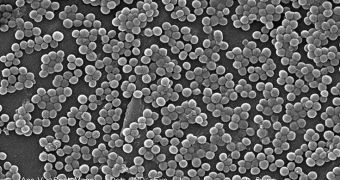Following a new investigation, researchers were able to discover a new strain of a dangerous bacteria, living in cows and humans. The finding is very concerning because the microorganisms is already resistant to the action of standard antibiotics.
Methicillin-resistant Staphylococcus aureus (MRSA) is one of the leading causes of intra-hospital infections around the world, alongside companions such as P. aeruginosa. It most attacks the weakest people, whose immune systems cannot protect them.
These groups include patients suffering from AIDS or cancer, who are intubated, or who have just had a transplant or major surgery. MRSA can survive on the seemingly clean surfaces in operating rooms, and there is really very little doctors can do to destroy it.
S. aureus was initially responsive to standard medication, but it eventually became resistant to antibiotics, due to a variety of reasons. Now, a new strain of the microorganism has just been identified.
The work was carried out by investigators at the University of Cambridge, in the United Kingdom, who were led by expert Dr. Mark Holmes. The group was researching a type of infection called mastitis, that usually affects cows.
Instead, they found a new type of MRSA. One of the most disturbing conclusions in the new research is the fact that existing tests cannot readily detect the microorganism. Slide agglutination testing and a polymerase chain reaction technique (PCR) are the main methods in use today.
Full details of the discovery appear in the June 3 issue of the esteemed journal The Lancet Infectious Diseases. The main conclusion of the study is that new detection methods need to be created for this advanced strain.
“To find the same new strain in both humans and cows is certainly worrying. However, pasteurization of milk will prevent any risk of infection via the food chain” says former Cambridge Veterinary School PhD student Dr. Laura García-Álvarez.
“Workers on dairy farms may be at higher risk of carrying MRSA, but we do not yet know if this translates into a higher risk of infection. In the wider UK community, less than 1% of individuals carry MRSA – typically in their noses – without becoming ill,” she adds.
The expert is also the first author of the new research paper.
“The majority of MRSA testing in British hospitals is performed by seeing if the bacteria will grow in the presence of antibiotics, typically oxacillin and cefoxitin, rather than methicillin – which is now no longer manufactured,” Holmes says.
“This type of testing detects both the new MRSA and conventional MRSA,” he concludes.

 14 DAY TRIAL //
14 DAY TRIAL //